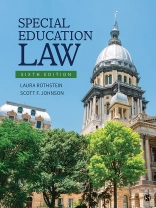Special Education Law, Sixth Edition, written by Laura Rothstein and Scott F. Johnson, provides a comprehensive and current overview of the major federal law, and judicial interpretations of those laws, that apply to special education students. School administrators and attorneys attend to special education issues on a regular basis, and local superintendents, principals, special education professionals, psychologists, and regional and state administrators must also be familiar with the legal requirements of educating students with disabilities. Classroom teachers in all types of classrooms need to be aware of the laws that affect them and their students. Special Education Law 6e is intended for students in education and educational administration, both graduate and undergraduate, as well as law students in courses on special education law, school law, and special education.
The framework of this book begins with five introductory chapters on the major issues that are addressed in special education
law. These topics include an overview the legal system, the history of special education, major statutes in special education law, stakeholders such as students, families, educators, and advocates, and finally, requirements for protection under various special education laws. The remainder of the text presents and analyzes special education case law within specific contexts. The text helps educators understand what the law requires so that they can make decisions that comply with these laws.
Updates for the sixth edition include a major reorganization of the text. Chapters have been streamlined and edited for clarity, combining a previous chapter on Related Services with Free Appropriate Publication Education, and folding Eligibility into Identification, Evaluation, and Eligibility, so students can better see the connections between these topics. Many case excerpts have been shortened or summarized to provide students with a more straightforward and focused reading experience. The latest updates in statutes, regulations, and case law are included throughout the text.
Inhaltsverzeichnis
Preface
Acknowledgments
About the Authors
Cases in Order of Appearance
Cases Alphabetized
Chapter 1: The Legal System and How It Works
State and Federal Laws
The Judicial System
Agency Hearing and Investigative Decisions
Relationship of Constitutional Law, Statutory Law, Regulatory Law, and Case Law in the Development of Special Education Laws
Chapter 2: Students with Disabilities: History of the Law
Special Education Before the 1970s
A Constitutional and Political Framework for Change
Statutory Responses
Chapter 3: Statutory Provisions
Section 504 of the Rehabilitation Act
The Americans with Disabilities Act
Section 504 and the Americans with Disabilities Act and Application to Special Education Settings
The Individuals with Disabilities Education Act
No Child Left Behind and Every Student Succeeds Act
Student Education Statutes
What Constitutes an Education Record?
Access and Accuracy
Remedying FERPA Violations
Notice Requirements
Educational Records in IDEA Procedures
Other Relevant Laws
Chapter 4: The People
Students
Parents
Educators
Related Service Providers
Advocates
Decision Makers
Chapter 5: Who Is Protected
Constitutionally Based Cases
Cases Under the IDEA
Section 504 and the Americans with Disabilities Act and Application to Special Education Settings
Special Situations
Chapter 6: Identification, Evaluation, and Eligibility
Identification—The Beginning of the Special Education Process
Obtaining Consent to an Evaluation
Evaluation Procedures and Limitations
Protection Against Discrimination
Payment for Evaluations
Independent Evaluations
Reevaluation
Eligibility
Specific Learning Disabilities and Response to Intervention (RTI)
Eligibility Determination
Chapter 7: Free Appropriate Public Education
The Rowley Standard
Extended School Year (ESY) Services
Cost Issues
Budgetary Constraints on Educational Agencies
Which Public Agency Is Responsible?
Private Obligations
Rehabilitation Act and the Americans with Disabilities Act
Chapter 8: Individualized Education Program
The Individualized Education Program (IEP) Overview
IEP Development and Content
Consent and Disputes
Reviewing and Revising the IEP
Related Services
Transportation
Psychological Services and Counseling
Health Services
Other Related Services
Chapter 9: Placement and Least Restrictive Environment
IDEA Foundations
The Classroom
The Local School
Separate Facilities
Other Issues
Chapter 10: Private School Placements, Residential Placements, and Public School Choice Programs
Public Agency Placement in Private Schools
Parental Placements in Private Schools
School Choice and Students With Disabilities
Residential Placements
Chapter 11: Special Issues With Secondary Students
Graduation Requirements
Vocational Education
Dual Credit Programs
Transition Services
Postsecondary Academic Education
Documentation
Chapter 12: Procedural Safeguards
Due Process Procedures under the IDEA
Enforcement
When Are Due Process Procedures Triggered?
Transfer of Rights
Status of Student Pending Final Decision (Stay-Put)
Dispute Resolution
Chapter 13: Discipline
Historical Context
Legislative Revisions
Special Circumstances
Incarcerated Juveniles
Chapter 14: Americans with Disabilities Act and Section 504 of the Rehabilitation Act
Who Is Covered
Otherwise Qualified
Discrimination
Architectural and Other Barriers
Criteria With Discriminatory Impact
Reasonable Accommodation Issues
Discrimination Related to Association
Section 504 Plans in Schools
Complaints to the Department of Education
Dispute Resolution for Violations of Section 504, the Americans with Disabilities Act, and the Constitution
Chapter 15: Remedies
Damages
Tuition Reimbursement
Compensatory Education
Attorneys’ Fees
Enforcement and Remedies under Section 504 and the Americans with Disabilities Act
Other Remedies
Chapter 16: Special Education Misconduct
Special Education Misconduct: An Overview
Injuries and Remedies
Barriers to Tort Type Damage Awards
Trends in Awarding Damages and Compensatory Education in Misconduct Cases
Chapter 17: The Status and Future of Special Education Law
Appendix A: Education and the American Legal System
Appendix B: Sequential Listing of Major Legal Developments for Students with Disabilities
Appendix C: Part B Individualized Education Program
Glossary
Über den Autor
Scott F. Johnson is a Professor of Law at Concord Law School of Kaplan University and a Special Education Hearings Officer with the New Hampshire Department of Education. He received his B.A. in political science from the University of North Carolina at Charlotte and his J.D. from Franklin Pierce Law Center. He is the author of numerous articles and books in various areas of education law, and he frequently develops professional development programs for educators and presents at national conferences. Prior to teaching, Professor Johnson practiced law and was involved in a number of precedent-setting education law cases. He began as co-author of Special Education Law with the Fourth Edition, and he brings to the text current practical perspectives.












